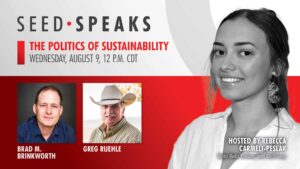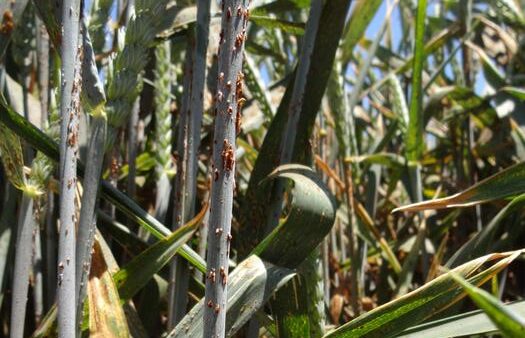Politics is certainly involved in the topic of sustainability and creating meaning behind the word.
During the Seed Speaks episode, The Politics of Sustainability, Brad M. Brinkworth, founding partner and managing director of sermo.farm Inc., and Greg Ruehle, COO of Arva Intelligence, chatted about various aspects of sustainability, including its definition, its politicization and its impact on legislation and industry practices. The conversation touched on how the term sustainability has become widely used and sometimes diluted due to its frequent use.
“For me, sustainability means making decisions today that are going to have a positive impact on the future,” said Ruehle. “It’s up to us, particularly in agriculture, to reclaim the term and define it according to our practices and values.” He emphasized that sustainability is about making choices that lead to a better future, ideally, without letting politics get in the way of that. The agricultural community needs to take control of the definition of sustainability and share their knowledge.
Both Brinkworth and Ruehle stressed the importance of education, communication, and collaboration to move towards meeting sustainability goals without excessive politicization. They discussed the need for the agricultural and seed sectors to define sustainability on their terms and communicate their efforts effectively.
With sustainability becoming such a popular word especially in politics, the meaning is getting lost.
“When sustainability becomes a political tool, it can obscure the real goals and create a polarized environment,” shared Brinkworth.
The politicization of sustainability can divert attention from genuine sustainability efforts. The goal across the board is to be able continue farming long term and have a healthy environment.
“We can bridge the gap by helping corporations and policymakers understand the positive impact of our practices,” continued Ruehle. “Collaboration and education are key… shape the narrative positively and ensure that sustainable practices remain the focus.”
By educating others about the benefits of sustainable practices, alignment with corporate and political goals can be achieved without negatively impacting agricultural practices. Collaboration, education, and engagement can guide sustainability conversations in a positive direction.
“By being proactive and confident in our practices, we can overcome this challenge and keep the focus on genuine sustainability efforts,” finished Brinkworth.
To balance political influences and maintain genuine sustainability efforts (and the true meaning of the word), Brinkworth suggested having members of the agriculture and seed sectors share their knowledge.












